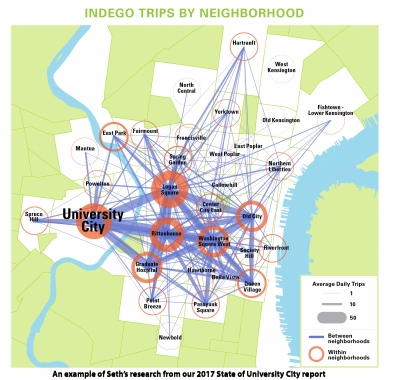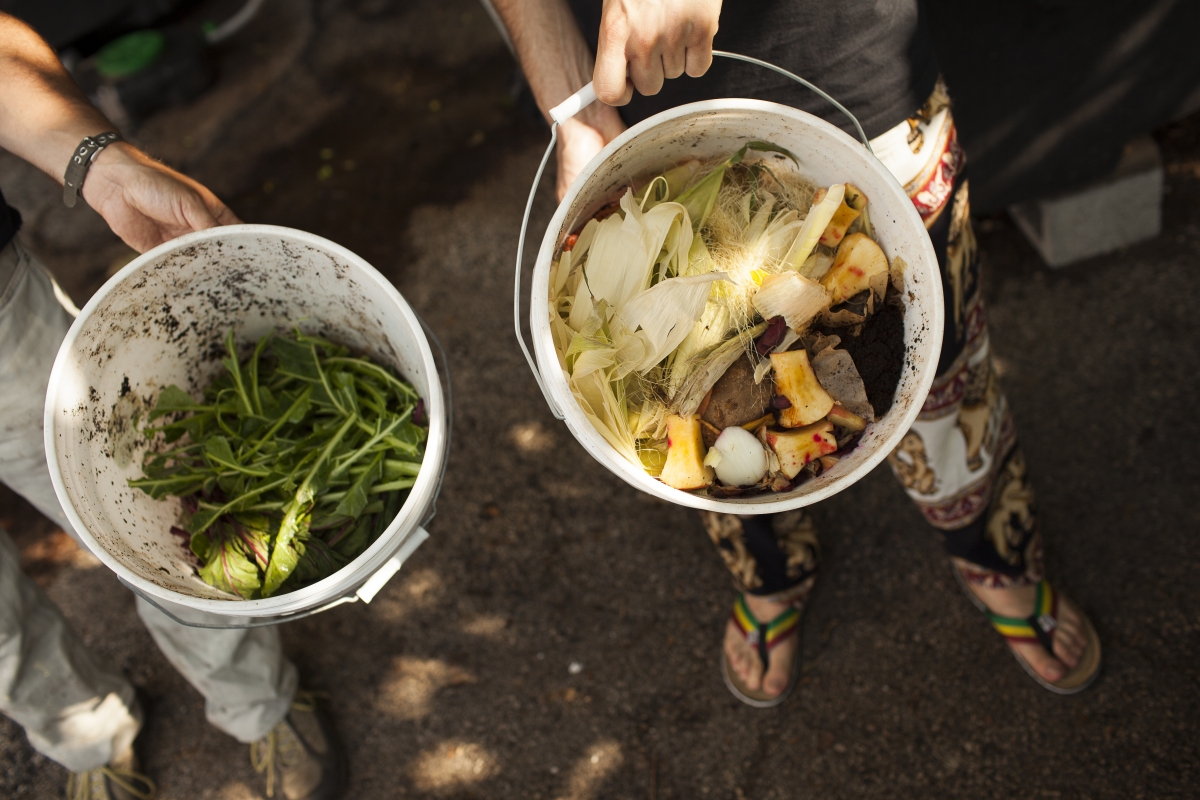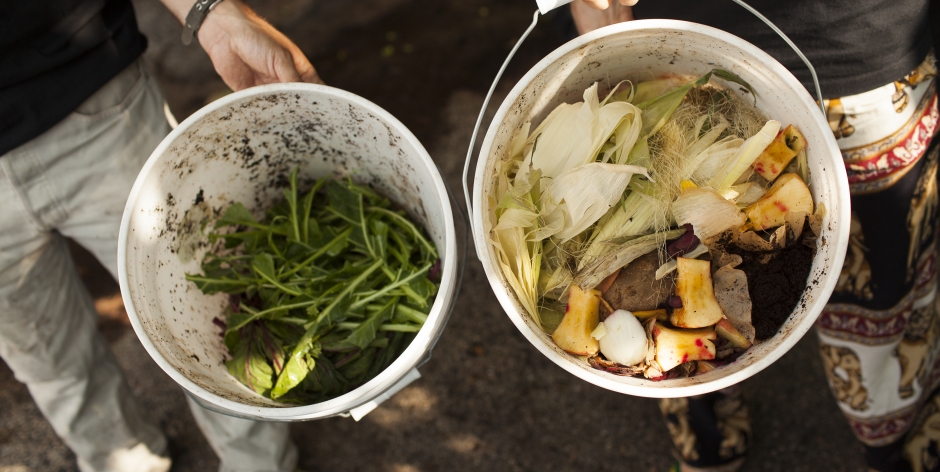
Visitors / Employees
The Dirt Factory
Seth Budick is a man with two identities at University City District. During office hours, he’s UCD’s Senior Manager for Policy and Research, the staff member responsible for compiling the data that informs almost every big decision UCD makes. Should we reevaluate the LUCY bus route? Let’s get Seth to study ridership statistics. Would a pedestrian plaza calm traffic at an intersection? Better check with Seth. What’s the breakdown of male versus female users who come to The Porch at 30th Street between the hours of 2PM and 4PM on Tuesdays? Seth will definitely know.
 But then, every Wednesday around 4:30 pm, Seth rushes into the nearest phone booth (or okay, the restroom) to change out of his office outfit and into his Dirt Factory costume of jeans, a t-shirt, and muddy shoes, ready to fight for sustainability one pound of organic compost at a time. And what motivates him?
But then, every Wednesday around 4:30 pm, Seth rushes into the nearest phone booth (or okay, the restroom) to change out of his office outfit and into his Dirt Factory costume of jeans, a t-shirt, and muddy shoes, ready to fight for sustainability one pound of organic compost at a time. And what motivates him?
“I hate waste,” Seth says over lunch at Xi’an Sizzling on Chestnut Street. “Half the reason I work at UCD is because I can’t stand trash on the streets. Little quality of life things are my obsession.”
To be fair, Seth has lots of obsessions. Restaurants with unique cuisines, many of which are found in University City, are one. Insects, which Seth studied in graduate school, are another. Data is, naturally, a big one for him. He delights in sharing complicated graphs representing the interesting things he studies, like the average speed of traffic after a snow storm compared to normal days (spoiler—people drove more quickly after the snow).
Seth’s road to UCD, and to running The Dirt Factory, was a circuitous one. A Manhattan native, he discovered Philadelphia during his college years at Swarthmore before pursuing a graduate degree in the evolution of insect behavior at Caltech. After grad school, he returned to Philadelphia and found an apartment in University City at 48th and Trinity. He spent time working with a few different non-profits and pursuing community gardening before landing a position as a data analyst at University City District in 2008.
At UCD he feels supported by bosses who have encouraged him to explore different ideas and passions because they knew these pursuits would eventually be valuable to the organization. It was this sort of support that originally spurred the creation of The Dirt Factory. Shortly after taking over as UCD’s executive director, now-president Matt Bergheiser came up with a novel idea after reading Seth Godin’s book Poke the Box. Matt challenged the staff to develop ideas for outside-the-box projects for UCD to invest in.
At the time, Seth was working on different sustainability initiatives, including rain barrel workshops, community leaf collection, and composting efforts. He had organized a community gardeners’ summit and learned that local growers were lacking access to compost.
“We realized it was something we could help with,” Seth says. UCD had been giving away backyard composters and buying compost from Fairmount Park to deliver to local gardeners. “It made people so happy,” Seth recalls. “Hundreds of gardeners were able to take advantage of this, but we realized it wasn’t the most sustainable solution.”
At the same time, another coworker had been engaging Market Street property owners about cleaning up vacant lots. One owner had an empty lot he was willing to let UCD use. Seth had recently learned the University of Pennsylvania was looking to part ways with two large composting tubs. “We realized we had the two raw elements—leaves we helped collect in the community [through our Public Space Maintenance programs] and food scraps [that people were collecting using the backyard composters UCD provided them]—and the demand for the finished product. We had a space available, composters available from Penn, and the hunger from the community, so we said ‘Let’s just do it.’”
And thus The Dirt Factory was born. Seth’s team received $10,000 from the Poke the Box project to fund the program. They obtained the two composters from Penn; bought a generator, lumber, and soil; and held an opening event in 2012 with beer, ice cream, and a live band. The first ton of organic fertilizer was distributed in December of that year.
 Since then, The Dirt Factory has built a core group of loyal users, some of whom are downright fanatic in their commitment to composting. Seth shares a story of a woman who used to work in a lab at Children’s Hospital. She was so dedicated to eliminating waste that she would collect coffee grounds from a shared kitchen space at CHOP and bring them to The Dirt Factory each week. When the small kitchen switched to a Keurig machine and individual coffee pods, she’d cut each pod open to extract the grounds.
Since then, The Dirt Factory has built a core group of loyal users, some of whom are downright fanatic in their commitment to composting. Seth shares a story of a woman who used to work in a lab at Children’s Hospital. She was so dedicated to eliminating waste that she would collect coffee grounds from a shared kitchen space at CHOP and bring them to The Dirt Factory each week. When the small kitchen switched to a Keurig machine and individual coffee pods, she’d cut each pod open to extract the grounds.
“That’s the level of dedication we see,” Seth says. “It’s so inspiring. We’ve had some people who have been coming from day one.” He estimates there’s a pool of about 100 households who compost their food scraps at The Dirt Factory, with approximately 30 of them dropping off in a given week. An almost entirely different group of people, including gardeners, shows up to collect the compost when it’s distributed at events like our upcoming Dirt Day on April 8th.
“People are just so grateful that we exist. Not a week goes by that I don’t hear from someone, or people saying they can’t believe that this is here.”
Seth does his part, too. Every Wednesday he brings his own food scraps to compost when he’s working at The Dirt Factory. As to what keeps him going, he explains, “There’s just something beautiful about of the idea of it. As a scientist the thing I value more than anything in the world is elegance. To me composting is an incredibly elegant process, especially when you do it as an entirely closed loop process in the neighborhood. It’s just beautiful. It’s an environmental win-win-win every way you can measure it.”
UCD ensures an even more closed-loop process by using some of the compost produced at The Dirt Factory for our own public spaces, and teaching the members of Green City Works, our social venture landscaping company, about the benefits of using natural, organic soil, which gardeners from our community affectionately refer to as “the good stuff.”
The innovation didn’t end with The Dirt Factory’s creation, either. Each year Seth comes up with new ways to increase community engagement. Last year we brought in Soil Kitchen to offer soil testing at Dirt Day. This year he’s been working with the Philadelphia Food Policy Advisory Council and Institute for Local Self-Reliance on a contest to design a compost system for composting sites throughout Philadelphia and beyond.
“We’re in a similar boat to other organizations who want to do composting on the community scale, but there’s not good technology out there to do it. You go from small backyard composters straight up to giant, commercial-grade composters that cost tens of thousands of dollars. We were trying to inspire people to come up with designs to fill that intermediate niche.”
The contest produced 13 entries, including a few from high school students at The Workshop School. Finalists will receive money to fund the production of their designs, and this summer, the designs will be tested at composting sites around the city. At the end of the summer we’ll pick a final winning design, which will then be shared as an open-source blueprint for anyone who wants to use it.
Come see The Dirt Factory for yourself at 4308 Market Street, either on the April 8th Dirt Day, or during regular hours on Wednesdays from 5-6 PM, or Saturdays from 10:30-11:30 AM. Finally, we’ll leave you with a video created by a fan of The Dirt Factory about her experiences.



